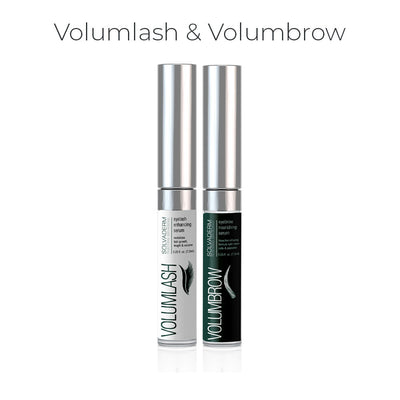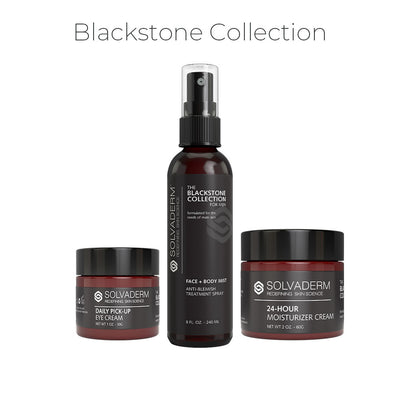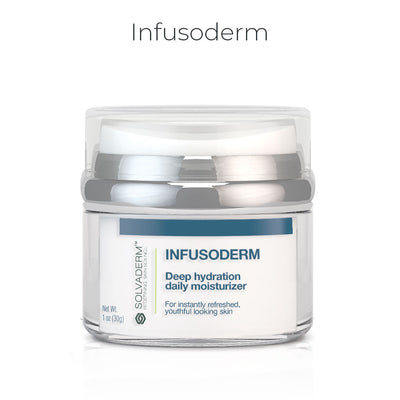While this condition isn’t dangerous, for some people it could reduce self-confidence and lead to distress in social situations. In this article, you’ll learn how to get rid of hyperpigmentation around your mouth to help you feel more self-assured about your appearance.
The development of brown spots around your mouth occurs largely due to exposure to UV rays, although there are other causes. Using concealer may diminish the spots somewhat, but it’s certainly not a long-term solution.
Fortunately, there are other treatment and prevention methods which we’ll examine closely in this article. If you want to know how to fix discolored skin around your mouth and related areas of your complexion, keep reading!
Fortunately, because there is still existing pigment remaining just below the skin's surface, you can treat the condition with the help of scrubs, creams, and/or medical procedures. To protect yourself from the sun’s rays, we recommend that you always use sunscreen outside to prevent your hyperpigmentation from further darkening.
Although it can also happen to men, women suffer more from this issue because melasma is associated with the use of oral contraceptives, sun exposure, genetics, and hormonal changes during menopause or pregnancy.
Although these dark patches are easily treatable, they do sometimes reappear. Melasma is more likely to affect you if you have a dark skin tone.
When your diet excludes essential vitamins like B12, your skin may darken unnaturally due to increased synthesis of the pigment melanin. The symptoms usually appear gradually and can affect many regions of your body.
A lack of Vitamin B12 could impact more than just your skin, it could also lead to other health problems including neurological damage. It’s important to ensure that you get enough B12 from your diet by consuming foods like lamb, fortified cereals, eggs, beef, organ meats, and dairy products.
In this section, we'll explain some of the medical and home-based solutions that have proven beneficial in preventing hyperpigmentation around the mouth.
There are serums on the market which contain a small concentration of chemical exfoliating agents like glycolic and salicylic acid, and are safe for home use. However, for serious hyperpigmentation, you may need to visit a dermatologist several times for a deep chemical peel.
Although kojic acid is primarily used to decrease hyperpigmentation, it may also be effective in treating other skin issues like fading scars. It’s important to use a product that includes only 1% or less kojic acid, as this ingredient is powerful.
For this reason, use a sunblock or hydrating moisturizer with at least 30% SPF like Dermaxsol daily to prevent hyperpigmentation, stop existing spots from spreading, soothe irritation, and lock in hydration.
You should apply the formula to your face, hands, and any other exposed areas of your body before you leave the house, in every season. If you're planning to stay outside, reapply every couple of hours as it tends to wear off. It’s a good idea to carry sunscreen with you wherever you go.
While three to six months may seem like a long time, the spots will gradually begin to look less noticeable during this period. If you want satisfactory long-term results, be patient and keep working at it.
It also makes your skin look more radiant and youthful by helping to smooth fine lines and wrinkles. After adding Vitamin C to your beauty routine, you should start noticing results within about three weeks. In roughly two months, this vitamin could considerably lessen hyperpigmentation around your mouth.
You should first see a dermatologist for diagnosis of the hyperpigmented area, and there are a number of procedures they offer to diminish the condition considerably.
There are also home remedies available, and it’s important to maintain a regular daily skincare regimen to help prevent the development of further hyperpigmentation around your mouth.
We offer a rich collection of quality skincare products which help fade dark spots, improve skin tone, and protect from harmful UV rays, so explore our collection to keep your skin healthy and free of hyperpigmentation!
The development of brown spots around your mouth occurs largely due to exposure to UV rays, although there are other causes. Using concealer may diminish the spots somewhat, but it’s certainly not a long-term solution.
Fortunately, there are other treatment and prevention methods which we’ll examine closely in this article. If you want to know how to fix discolored skin around your mouth and related areas of your complexion, keep reading!
What Causes Hyperpigmentation Around Your Mouth?
If you’re wondering how to remove skin discoloration around your mouth effectively, it's important to begin by finding out the specific reason for the problem. Various factors can cause dark spots near the mouth, and we’ll highlight a few in this section.Sun Exposure
UV rays can damage your skin cells, but it will usually take a few years for dark spots to appear on the sun-exposed areas of your skin. After their appearance, it's unlikely that they will fade without proper treatment.Fortunately, because there is still existing pigment remaining just below the skin's surface, you can treat the condition with the help of scrubs, creams, and/or medical procedures. To protect yourself from the sun’s rays, we recommend that you always use sunscreen outside to prevent your hyperpigmentation from further darkening.
Melasma
Melasma, sometimes known as the "mask of pregnancy," is characterized by brown or gray patches that typically appear on the skin of women experiencing fluctuating hormone levels.Although it can also happen to men, women suffer more from this issue because melasma is associated with the use of oral contraceptives, sun exposure, genetics, and hormonal changes during menopause or pregnancy.
Although these dark patches are easily treatable, they do sometimes reappear. Melasma is more likely to affect you if you have a dark skin tone.
Skin Trauma
Skin trauma may include acne, bug bites, eczema, wounds, scrapes, scratching, or friction from rubbing which can cause your skin to become inflamed. The inflammation can stimulate the production of dark pigmentation, leaving a colored spot behind even after the injury has healed. However, most of the time your skin returns to its regular hue within three to six months.Vitamin Deficiency
Vitamin B12 deficiency is prevalent, and many people may not realize that a B12 shortage is the cause of their hyperpigmentation. When you notice dark patches on your face, arms, or legs, it could indicate that your body is lacking in this crucial vitamin.When your diet excludes essential vitamins like B12, your skin may darken unnaturally due to increased synthesis of the pigment melanin. The symptoms usually appear gradually and can affect many regions of your body.
A lack of Vitamin B12 could impact more than just your skin, it could also lead to other health problems including neurological damage. It’s important to ensure that you get enough B12 from your diet by consuming foods like lamb, fortified cereals, eggs, beef, organ meats, and dairy products.
How to Get Rid of Hyperpigmentation Around Your Mouth?
While you might not always be able to prevent hyperpigmentation on your face completely, there are techniques you can use to lessen the likelihood of its recurrence.In this section, we'll explain some of the medical and home-based solutions that have proven beneficial in preventing hyperpigmentation around the mouth.
Medical Treatments
Hyperpigmentation is within the purview of a primary care physician or dermatologist. Before proceeding with a skin exam, the doctor will ask about your medical history and any symptoms you are experiencing. They may conduct a skin biopsy to rule out possible melanoma. Only a dermatologist can suggest and carry out procedures like IPL therapy, dermabrasion, and microdermabrasion.Laser Therapies
Laser therapy is a minimally invasive procedure in which the doctor directs laser energy at the area affected by hyperpigmentation. The aim is to destroy damaged cells and excess melanin, without affecting the surrounding tissue. Laser treatment is one of the most effective methods for treating dark pigmentation around the mouth. The results tend to be long-lasting, although factors like genetics and poor skin care practices may cause it to return.Chemical Peels
A chemical peel involves removing the top layer of your skin using a powerful solution. This procedure repairs damaged cells deep below the skin's surface, although the effects are not necessarily permanent. However, the results may last longer if you protect yourself from the sun’s rays, and begin treatment early. Chemical peels break up the dead, dry skin around the surface of your mouth and gradually uncover a shiny new layer underneath.There are serums on the market which contain a small concentration of chemical exfoliating agents like glycolic and salicylic acid, and are safe for home use. However, for serious hyperpigmentation, you may need to visit a dermatologist several times for a deep chemical peel.
Azelaic Acid
Azelaic acid exists naturally in grains like wheat and barley, and its anti-inflammatory properties make it an excellent choice for treating dry hyperpigmented skin caused by acne. Azelaic acid helps prevent discolored cells from multiplying, decreases hyperpigmentation, and improves skin tone. In addition, it helps to unclog pores, fight acne, and lighten brown or dark spots on your face.Kojic Acid
Kojic acid impedes the production of the skin pigment melanin, helping to fade dark spots. You should consult a dermatologist before you use it at home because this ingredient may have potentially adverse side effects.Although kojic acid is primarily used to decrease hyperpigmentation, it may also be effective in treating other skin issues like fading scars. It’s important to use a product that includes only 1% or less kojic acid, as this ingredient is powerful.
Preventive Tips for Hyperpigmentation Around the Mouth
Even after you’ve treated hyperpigmentation around your mouth successfully, it’s important to continue to take preventive measures to stop the issue from returning. To ensure that you remain free of hyperpigmentation, follow these steps.Wear Sunscreen
Sunlight stimulates the production of melanin, which acts as a natural sunscreen for our skin to safeguard it from the negative effects of UV radiation. However, frequent sun exposure without protection can cause excessive release of this pigment, possibly leading to hyperpigmentation.For this reason, use a sunblock or hydrating moisturizer with at least 30% SPF like Dermaxsol daily to prevent hyperpigmentation, stop existing spots from spreading, soothe irritation, and lock in hydration.
You should apply the formula to your face, hands, and any other exposed areas of your body before you leave the house, in every season. If you're planning to stay outside, reapply every couple of hours as it tends to wear off. It’s a good idea to carry sunscreen with you wherever you go.
Follow Doctor's Medication
Can you fix hyperpigmentation? Your dermatologist can prescribe a cream that will slow down the synthesis of the enzyme tyrosinase, which is required for the production of melanin. This should cause the darkening area around your mouth to gradually fade.Avoid Peak Sun Hours
UV rays from the sun can penetrate deeply into the skin, damaging cells. They also activate melanocytes, which leads to the secretion of melanin. Although this self-defense mechanism may help protect the skin from UV damage, it can also cause the area to darken from excess melanin buildup. For this reason, whenever possible you should plan outings around non-peak sun hours like early morning, late afternoon, or after sunset.FAQs
Question #1 - Does hyperpigmentation get darker before it fades?
Yes, hyperpigmentation around your mouth may get darker before it fades away. However, as long as you are using the best treatment methods to treat the underlying cause, it should eventually become lighter.Question #2 - How long does it take hyperpigmentation to fade?
Unfortunately, the answer to this question is not straightforward, because everyone will experience hyperpigmentation differently. With regular, appropriate skincare, the dark spots should fade in three to six months. However, in severe cases, it might take years.While three to six months may seem like a long time, the spots will gradually begin to look less noticeable during this period. If you want satisfactory long-term results, be patient and keep working at it.
Question #3 - How do you lighten hyperpigmentation?
The good news is that there are a number of procedures and treatments which can stop the overproduction of melanin and eliminate hyperpigmentation. For example, visit a doctor for a prescription or laser treatment, or try at-home products that contain ingredients such as azelaic or kojic acid.Question #4 - Why is my hyperpigmentation not going away?
Hyperpigmentation is a complex skin care problem which is typically caused by acne, sun damage, or hormonal changes. The solutions we have provided may help fade dark spots, but you still have to carry out preventative measures like wearing sunscreen, exfoliating gently, and addressing the root cause of the issue to ensure that the hyperpigmentation disappears.Question #5 - Is vitamin C good for hyperpigmentation?
Yes! Vitamin C helps reduce hyperpigmentation, brown spots, and even out your skin tone. This antioxidant-rich nutrient can enhance skin luminosity by shielding skin cells from free radicals and preventing melanin production.It also makes your skin look more radiant and youthful by helping to smooth fine lines and wrinkles. After adding Vitamin C to your beauty routine, you should start noticing results within about three weeks. In roughly two months, this vitamin could considerably lessen hyperpigmentation around your mouth.
Conclusion
Although hyperpigmentation is not a serious health issue, having an uneven skin tone can be bothersome to some people. You may eliminate the dark spots on your skin and restore your confidence by following an effective treatment plan.You should first see a dermatologist for diagnosis of the hyperpigmented area, and there are a number of procedures they offer to diminish the condition considerably.
There are also home remedies available, and it’s important to maintain a regular daily skincare regimen to help prevent the development of further hyperpigmentation around your mouth.
We offer a rich collection of quality skincare products which help fade dark spots, improve skin tone, and protect from harmful UV rays, so explore our collection to keep your skin healthy and free of hyperpigmentation!








